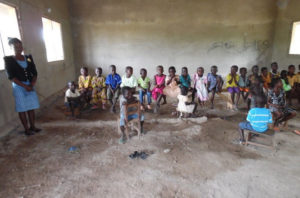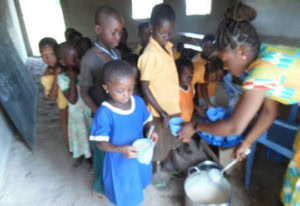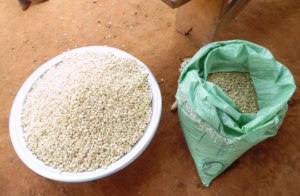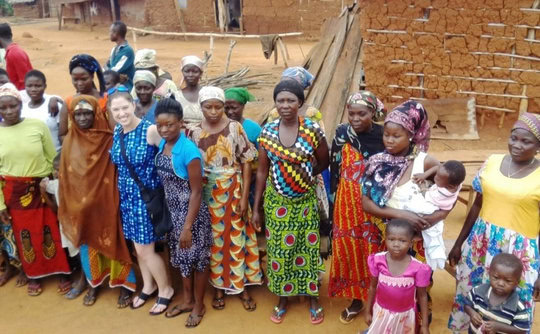
Fankamawe, a rural community in Ghana has no electricity or pipe borne water. There is one bore hole serving the entire community of 300 people. They are predominantly farmers and the women do palm oil processing to earn additional income for their family upkeep.
Fankamawe is 4 km (about 2.5 miles) from the district capital, Nkawie. The road to the community is not tarred and very dusty, especially, in the dry season. There are no vehicles plying this road regularly so people trek to get basic supplies from the capital. It has no school and children must travel 8 km (about 5 miles) daily to and from school in Nkawie. It is difficult for children under six years of age to trek this far to school and as a result they stay at home all day and this deny their mothers the much needed time to focus on their jobs. The children play most of the time in a dusty environment; a condition conducive for worm infestation.

A school being built by the government for the community is taking much longer than expected to complete. A three-classroom block started by the government in 2009 is not finished and it does not look like it will be done anytime soon.
In February 2014, Self-Help International (SHI) staff visited Fankamawe

and discussed challenges confronting the people and possible remedial measures. After subsequent visits and discussions, Fankamawe now has a school for the children under six years of age in the community. There are three female volunteers on whose shoulders the school rests; Alima, Zuwera and Safinatu. Zuwera is the teacher while Alima and Safinatu are the caterers. It is worth noting that

the response by the community to start a school that would provide breakfast for the children every morning was unprecedented. Almost instantly they provided maize needed to feed the children for a whole school term.
The QPM breakfast is attracting children from neighboring villages and school enrollment is increasing progressively. Enrollment has increased from 28 pupils on Nov. 3, 2014 to 35 on Dec. 17, 2014.

As the children continue to attend and stay in school, they acquire knowledge, stay healthier, and their parents have ample time to focus on their jobs raising the necessary income for proper care of their families.

Powered by Wapiti Digital #servetheherd
This is my rich text.
This is more rich text.
I am a list
Lists are cool